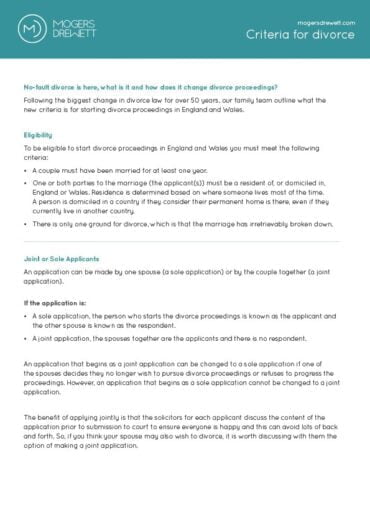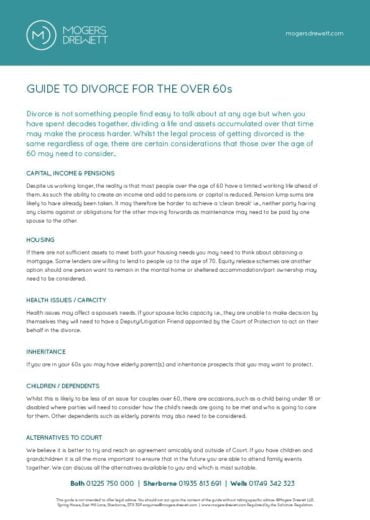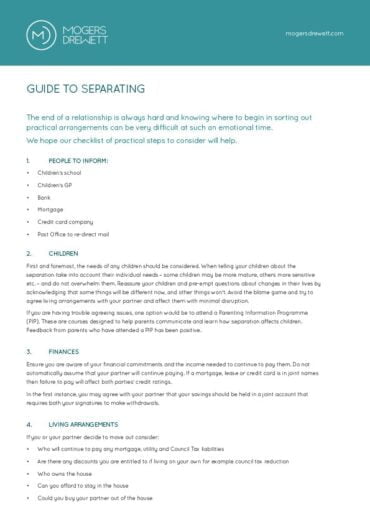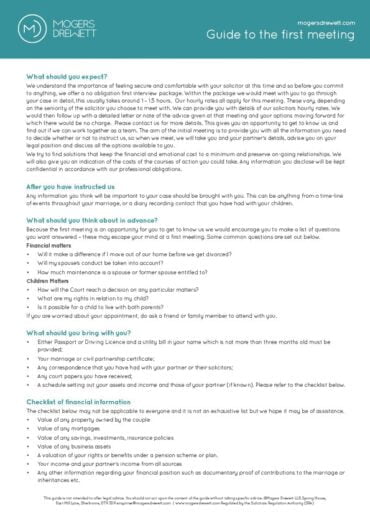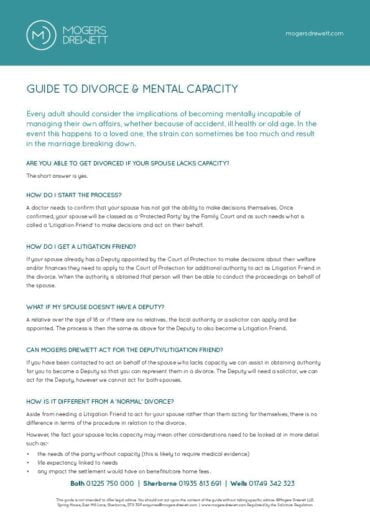Divorce solicitors, with you at every step
Having made the difficult decision to end a relationship, the last thing you want is a long and emotionally draining divorce. Our family team understand that you need your divorce to be as straightforward as possible and that you want the right settlement. We will work with you to achieve this.
The introduction of the no-fault divorce in England and Wales has undoubtedly made the process of divorce less acrimonious, by removing the need to blame one party. But the process of getting divorced is still a difficult and emotional journey for most couples. Our team of divorce solicitors can support you, ensuring your interests are protected to enable you to move forward in the future.
Our services include:
Divorce and pensions
When you are going through a separation there are lots of things to think about, and pensions might not be top of your priority list. But your pension(s) might be your most valuable assets, so it’s important to take them into account when deciding on how your money and property will be shared.
If you are married or in a civil partnership and you divorce or dissolve your civil partnership you might be entitled to some, of your partner’s pension. This will depend on what’s agreed and/or ordered by the Court. A pension can only be shared if a Court Order (called a Pension Sharing Order) has been made by a judge.
Our financial planning team can discuss whether pension sharing is right for you and our legal experts can guide you through the process of getting a Pension Sharing Order.
Divorce and businesses
Typically, businesses and their value are included within the assets to be shared within the divorce settlement, even if one spouse has never been involved in the business. A 50/50 split is not, however, guaranteed and there may be many reasons why your spouse might not be entitled to half of your business or where receiving half of the business is not in the best interests of one party. That is why it is important to seek expert legal advice early in the proceedings.
When a divorce involves a business, our divorce specialists will carefully investigate to determine who is entitled to what and negotiate on your behalf to ensure a fair settlement is agreed.
For example with a family business, one spouse might retain the business while the other spouse receives a larger share of another asset to ensure fairness. If a shareholder is getting divorced it is important to consider the implications on other directors, shareholders and employees that any transfer of shares may have.
Divorce and farms
All relationship breakdowns are upsetting, but when farming families are affected by divorce, the impact can be particularly significant.
Farming businesses are often joint ventures run in partnership between spouses and/or multiple generations of a family, with shared responsibility and ownership of the business, land and assets. It’s also standard practice for farming families to transfer property and assets to the next generation of farmers to minimise liability for inheritance tax after death.
These complex ownership structures can make divorces in farming families extremely difficult to resolve. Our farming divorce solicitors have extensive experience in dealing with farming divorces, and understand the specific needs of the separating couple and that of the wider farming family.
Divorce and trusts
When couples are separating, disputes can arise as to whether the assets contained within a trust are available for division between the parties, or whether they should be excluded from the “matrimonial pot”.
In these circumstances our team of experts can help you determine if a trust has been created for a genuine purpose or as a means of reducing your financial claims.
Next steps: get in touch
If you are thinking of getting divorced or dissolving a civil partnership and need legal advice on where to start and how to ensure a fair settlement, contact our friendly divorce solicitors on: 0800 533 5349 or enquiries@mogersdrewett.com.
Meet the team
Frequently asked questions
Putting in place a shareholder agreement that sets out what would happen if a shareholder had to sell or transfer their shareholding is essential to protect your company. Our commercial team can advise you on how to put this in place to protect your business in the future. Policies to protect your business
The person best suited to value a business is a forensic accountant. We can introduce you to accountants that are experienced in dealing with divorce cases and with whom we have worked closely with over many years.
As of the 6th April 2022, separating couples are now able to get a divorce, civil partnership dissolution or legal separation without having to blame each other for the breakdown of their relationship.
The Divorce, Dissolution and Separation Bill, which introduced no-fault divorce, has put the following no-fault divorce laws in place:
- The sole ground of irretrievable breakdown of the relationship
- Removed the requirement to establish one or more facts to prove irretrievable breakdown
- Updated the divorce language, for example:
- ‘Decree Nisi’ has become a ‘Conditional Order’
- ‘Decree Absolute’ has become a ‘Final Order’
- ‘Petitioner’ (the person submitting the application) has become the ‘Applicant’
- Introduced joint applications where couples who both agree that a relationship has irretrievably broken down can apply together (applicants are still able to submit a sole application if their partner does not agree)
- Removed the ability to contest a divorce, dissolution or separation (save for in very specific and limited circumstances)
- Introduced a new minimum period of 20 weeks from the start of proceedings to when the Conditional Order can be made
- Kept the six-week period between the Conditional Order and when the Final Order can be made
You cannot begin divorce proceedings until you have been married for at least a year.
It is now estimated that no-fault divorce proceedings take a minimum of 26 weeks to finalise. There are now two separate minimum waiting periods. A 20-week waiting period for the Conditional Order (this was formerly known as the Decree Nisi) to be issued and a further six-week waiting period for the Final Order (this was formerly known as the Decree Absolute).
No, a no-fault divorce cannot be contested, except in extremely limited circumstances, which the Court feels compelled to investigate further.
In theory, the introduction of the no-fault divorce should make the process much more straightforward and therefore make it easier for couples to manage their own divorce.
But after a divorce application is made and before a Final Order is issued, there will still be a number of important details that need to be carefully considered, such as the division of finances and what will happen to any children in the relationship. If these are not agreed and finalised legally then this could result in further legal action in the future.
20 weeks after submitting an application to the Court declaring that the marriage has broken down irretrievably, you can apply for a Conditional Order, which is the first stage of the divorce. The 20-week cooling-off period gives couples time to consider whether this is the right course of action for them and whether the relationship is irretrievable.
Six weeks and a day after the Court makes the Conditional Order, you can apply to the Court for a Final Order (either as a sole applicant or as joint applicants with your spouse). This legally ends your marriage. You are probably best advised not to make the application for a Final Order until after the finances have been resolved and a Court Order made about the finances.

